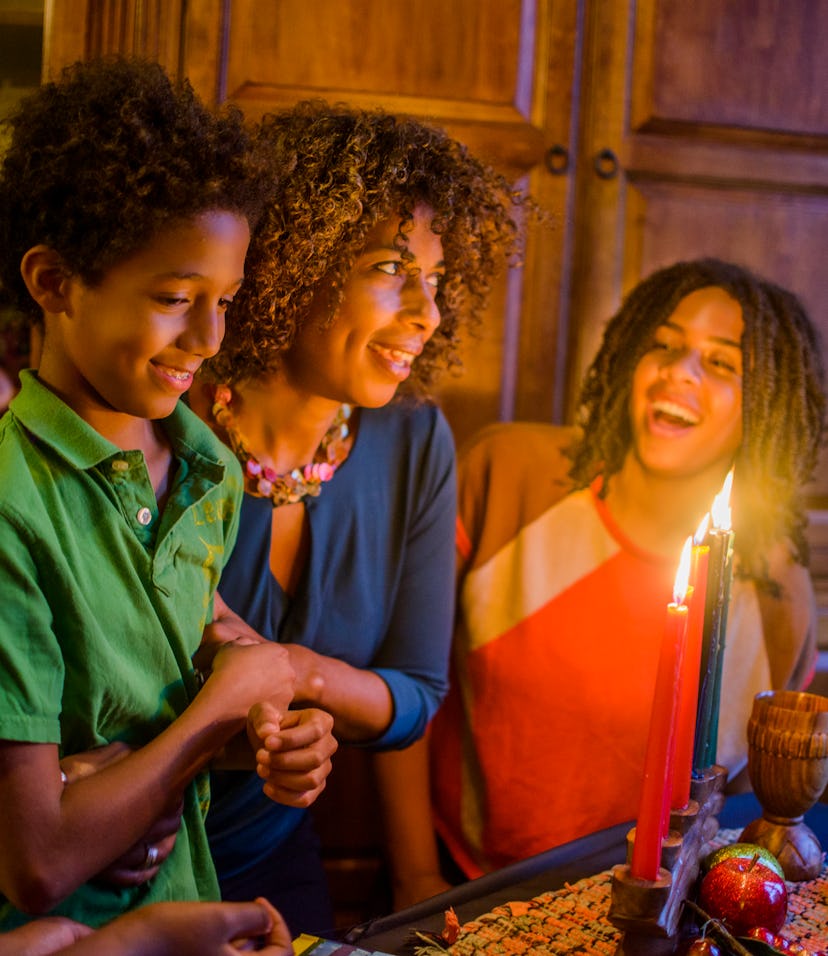Holidays

Matunda ya kwanza!
The day after Christmas kicks off a weeklong celebration of Black culture and heritage called Kwanzaa, starting on Dec. 26 and ending Jan. 1.
It will look a little different this year, with many Kwanzaa activities being virtual due to the pandemic. But families can still enjoy and celebrate this unique holiday.
What do you know about Kwanzaa?
Here are a few interesting facts and myth breakers about Kwanzaa for those who may be a little out of the loop.
- Kwanzaa was created in 1966 by Dr. Maulana Karenga as an African American and Pan-African holiday and a way for the Black community to celebrate their roots and culture.
- The Seven Principles, also known as Nguzo Saba, are in Swahili because according to Karenga, it is the only African language that is not defined by an African tribe or region, CNN reported. Those principles are: Umoji (unity), Kuijchagulia (self-determination), Ujima (collective work and responsibility), Ujamaa (cooperative economics), Nia (purpose), Kuumba (creativity), and Imani (faith). Each day is dedicated to a principle in which families practice specific activities to exemplify that principle.
- The name Kwanzaa comes from the Swahili phrase matunda ya kwanza, which means first fruits.
- Like Hanukkah, candles are placed on a special candle holder called a kinara. Three red candles are placed on the left, three green candles are placed on the right and a single black candle is placed in the middle. A candle is lit each day during the seven-day celebration.
It's not just a "Black holiday" or a religious one
You do not have to be Black to celebrate or understand how Kwanzaa works. Kwanzaa is a non-religious holiday celebrated by different races and ethnic groups across the world. According to the National Retail Federation, about 2.6% of people surveyed said they planned to celebrate Kwanzaa after Christmas this year.
“Kwanzaa has always been about the celebration of values that transcend through racial boundaries," author Lee Standberry wrote. "The seven principles of unity, self-determination, collective work/responsibility, cooperative economics, purpose, creativity, and faith; find purchase in the mind and hearts of everyone. These principles reinforce the concept of community – in a community – not just African-American ones.”
However, scholars caution non-Blacks who do choose to celebrate to understand the difference between cultural misappropriation and appreciation.
"When invited, I go to cultural and religious celebrations that are not part of my cultural or religious heritage. I participate in a way that is comfortable for my host and for me," Akilah Bolden-Monifa wrote in a still viral 2013 CBS article . "It would be arrogant of me, a non-Jew, to dominate a Seder or Hanukkah celebration, for example. People who are not of African descent should approach Kwanzaa with the same attitude.”
Alright, now since we have the education out of the way, here are a few ways you can celebrate this year, including a few virtual opportunities.
Kwanzaa Crafts for Kids
After teaching your kids about the meaning of Kwanzaa, let's have fun with it! Create a mkeka mat with construction paper, paint a unity cup, make a paper chain of seven green, red and black rings. The options are endless!
Virtual Kwanzaa Games
From puzzles, to audiobooks and virtual coloring, there are plenty of educational games for both kids and adults to indulge in safely from home. Kwanzaa-themed games such as Myrshim and Mancala are great games to play with family and friends.
Cook Kwanzaa-themed Dishes
Food is a universal language that's good for any soul. The Kwanzaa feast is known as the Karamu. Get culinary creative dishes like jerk chicken, stews, candied yams, plantains, creole gumbo and more. Remember Kwanzaa is a celebration of African and African American culture so the food options for dinner can be endless, from southern soul food to the Motherland. The Food Network and Better Homes & Gardens offers a few meal suggestions.
Homemade Gift-Giving
This one is great for creatives. Like Christmas, gifts are given on the last day of Kwanzaa. Most presents are homemade and represent African/African American culture. Good homemade gift ideas are quilts, scrapbooks, dolls and jewelry. Kwanzaa gifts for kids are called zawadi and are normally educational, such as books and games. But if you're not the creative type, you can go to the store or online for your Kwanzaa gifts. Sites such as Pinterest and Giftsicle list a few fun ideas.